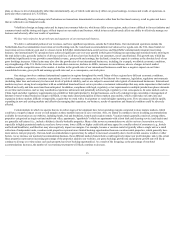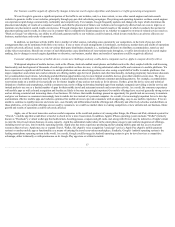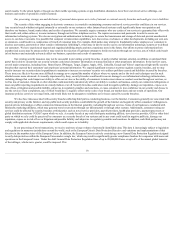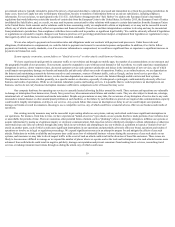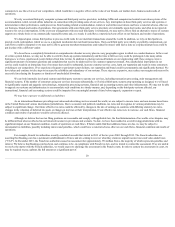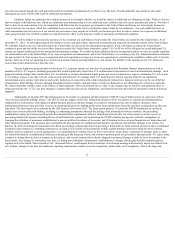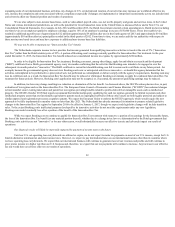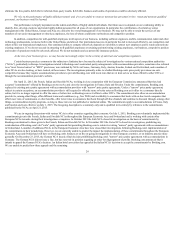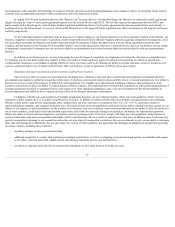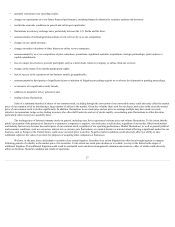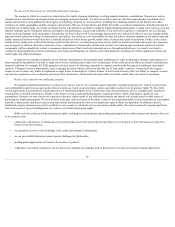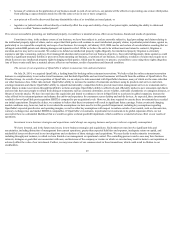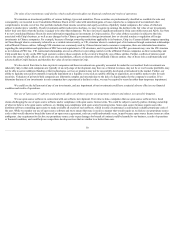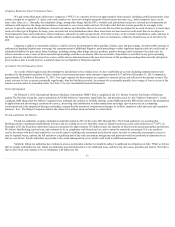Priceline 2015 Annual Report Download - page 28
Download and view the complete annual report
Please find page 28 of the 2015 Priceline annual report below. You can navigate through the pages in the report by either clicking on the pages listed below, or by using the keyword search tool below to find specific information within the annual report.
investigations in other countries will ultimately be resolved. Possible outcomes include requiring Booking.com to amend or remove its rate parity clause from its
contracts with accommodation providers in those jurisdictions and/or the imposition of fines.
In August 2015, French legislation known as the "Macron Law" became effective. Among other things, the Macron Law makes price parity agreements
illegal, including the "narrow" price parity agreements agreed to by the French NCA in April 2015. The law also requires that agreements between OTCs and
hotels comply with a French agency contract form. Similar legislation prohibiting "narrow" price parity agreements has been proposed in Italy and currently is
awaiting action by the Italian Senate. It is not yet clear how the Macron Law or the proposed Italian legislation may affect our business in the long term in France
and Italy, respectively.
To the extent that regulatory authorities impose fines on us or require changes to our business practices or to those currently common to the industry, our
business, competitive position and results of operations could be materially and adversely affected. Negative publicity regarding competition investigations could
adversely affect our brands and therefore our market share and results of operations. Further, the Macron Law and any similar legislation enacted by other
countries, and the decision by the German NCA to prohibit "narrow" price parity agreements, could have a material adverse effect on our business and our results
of operations, in particular if consumers use our services to shop for accommodation reservations but make their reservations directly with an accommodation
provider.
In addition, as our business grows, we may increasingly become the target of competition investigations or be limited by anti-trust or competition laws.
For example, our size and market share may negatively affect our ability to obtain regulatory approval of proposed acquisitions, our ability to expand into
complementary businesses or our latitude in dealing with travel service providers (such as by limiting our ability to provide discounts, rebates or incentives or to
exercise contractual rights), any of which could adversely affect our business, results of operations or ability to grow and compete.
Regulatory and legal requirements and uncertainties could harm our business.
The services we offer are subject to legal regulations (including laws, ordinances, rules and other requirements and regulations) of national and local
governments and regulatory authorities around the world, many of which are evolving and subject to the possibility of new or revised interpretations. Our ability to
provide our services is and will continue to be affected by such regulations. For example, laws and proposed legislation relating to data localization in some
countries could adversely affect our ability to conduct business in those countries. The implementation of unfavorable regulations or unfavorable interpretations of
existing regulations by judicial or regulatory bodies could require us to incur significant compliance costs, cause the development of the affected markets to
become impractical and otherwise have a material adverse effect on our business and results of operations.
Compliance with the laws and regulations of multiple jurisdictions increases our cost of doing business. These laws and regulations, which vary and
sometimes conflict, include the U.S. Foreign Corrupt Practices Act, the U.K. Bribery Act and local laws which also prohibit corrupt payments to governmental
officials or third parties, data privacy requirements, labor relations laws, tax laws, anti-trust or competition laws, U.S., E.U. or U.N. sanctioned country or
sanctioned persons mandates, and consumer protection laws. Violations of these laws and regulations could result in fines and/or criminal sanctions against us, our
officers or our employees and/or prohibitions on the conduct of our business. Any such violations could result in prohibitions on our ability to offer our services in
one or more countries, could delay or prevent potential acquisitions, and could also materially damage our reputation, our brands, our international expansion
efforts, our ability to attract and retain employees, our business and our operating results. Even if we comply with these laws and regulations, doing business in
certain jurisdictions could harm our reputation and brands, which could adversely affect our results of operations or stock price. In addition, these restrictions may
provide a competitive advantage to our competitors unless they are also subject to comparable restrictions. Our success depends, in part, on our ability to anticipate
these risks and manage these difficulties. We are also subject to a variety of other regulatory and legal risks and challenges in managing an organization operating
in various countries, including those related to:
• regulatory changes or other government actions;
• additional complexity to comply with regulations in multiple jurisdictions, as well as overlapping or inconsistent legal regimes, in particular with respect
to tax, labor, consumer protection, digital content, advertising, promotions, privacy and anti-trust laws;
• our ability to repatriate funds held by our international subsidiaries to the United States at favorable tax rates;
25


